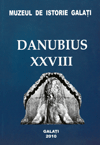Témoignages épigraphiques sur le culte impérial en Illyricum durant le règne d’Octave Auguste (27 a.Chr. - 14 p.Chr.)
Epigraphic Testimonies Regarding the Imperial Cult in Illyricum during the Reign of Octavian Augustus (27 B.C.–14 A.D.)
Author(s): Andreea Raluca BarbosSubject(s): History
Published by: Muzeul de Istorie „Paul Păltănea” Galaţi
Keywords: imperial cult; Octavian Augustus; Illyricum; inscriptions
Summary/Abstract: The worship of the Emperor was a special phenomenon in the religious life of the Roman Empire. The diffusion of cult of the ruler in the Roman West determined a change in mentality, both in case of the Roman citizens and of the subdued populations. In Illyricum, the imperial cult meant the perpetuation of the tradition in which Augustus' name was associated to a local divinity, such as Vulkanus Augustus sacrum, Liber and Libera, Victoria Augusta, Ianus Pater Augustus sacrum, Hercules Augustus sacrum. It also meant the perpetuation of the old forms of synnaos, divo Augusto et Romae. The worship of Octavian Augustus, alone or in association with a local divinity, was done, according to the epigraphic documents, on altars. Such places of cult were found in Pannonia, at Batmonostor, the sacerdos being the decurion of the colony of Aquincum himself. From the same colony originates another altar dedicated to Liber and Libera, both divinities bearing Augustus' name. Some other fragments of altars were found on the Norican territory, raised in honour of the goddess Victoria Augusta and of the god Vulkanus Augustus sacrum. From a social perspective, the imperial ideology had an impact on the upper classes of the provincial Roman society, especially in the senatorial and equestrian medium. Those who had sacerdotal functions were generally members of the provincial administration. Thus, we have epigraphic documents describing the governor P. Cornelius Dolabella (14-20 A. D.) as an active worshipper of the Princeps and of his family. Other flamines or sacerdotes were superior magistrates in the colonies and cities, IIIIviri, decurions, IIviri. We also came across a praefectus cohortis, P. Bennius Sabinus, who had two sacerdotal functions, flamen Augustales and augur.
Journal: Danubius
- Issue Year: XXVIII/2010
- Issue No: 1
- Page Range: 25-32
- Page Count: 7
- Language: French

